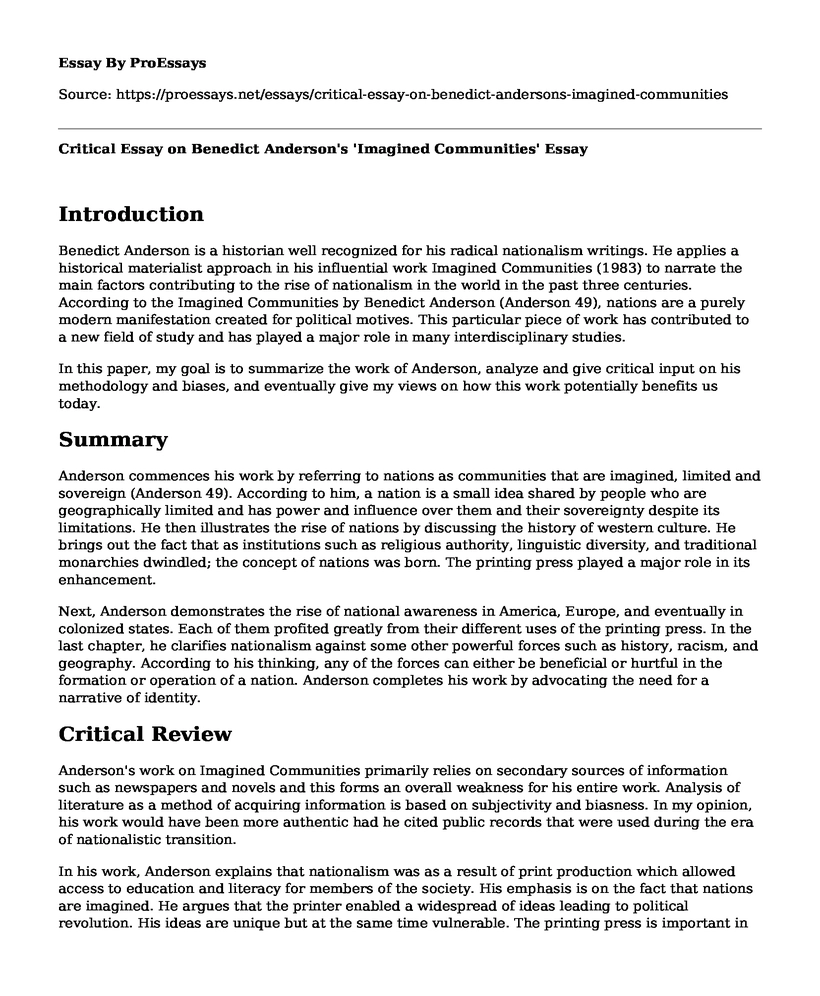Introduction
Benedict Anderson is a historian well recognized for his radical nationalism writings. He applies a historical materialist approach in his influential work Imagined Communities (1983) to narrate the main factors contributing to the rise of nationalism in the world in the past three centuries. According to the Imagined Communities by Benedict Anderson (Anderson 49), nations are a purely modern manifestation created for political motives. This particular piece of work has contributed to a new field of study and has played a major role in many interdisciplinary studies.
In this paper, my goal is to summarize the work of Anderson, analyze and give critical input on his methodology and biases, and eventually give my views on how this work potentially benefits us today.
Summary
Anderson commences his work by referring to nations as communities that are imagined, limited and sovereign (Anderson 49). According to him, a nation is a small idea shared by people who are geographically limited and has power and influence over them and their sovereignty despite its limitations. He then illustrates the rise of nations by discussing the history of western culture. He brings out the fact that as institutions such as religious authority, linguistic diversity, and traditional monarchies dwindled; the concept of nations was born. The printing press played a major role in its enhancement.
Next, Anderson demonstrates the rise of national awareness in America, Europe, and eventually in colonized states. Each of them profited greatly from their different uses of the printing press. In the last chapter, he clarifies nationalism against some other powerful forces such as history, racism, and geography. According to his thinking, any of the forces can either be beneficial or hurtful in the formation or operation of a nation. Anderson completes his work by advocating the need for a narrative of identity.
Critical Review
Anderson's work on Imagined Communities primarily relies on secondary sources of information such as newspapers and novels and this forms an overall weakness for his entire work. Analysis of literature as a method of acquiring information is based on subjectivity and biasness. In my opinion, his work would have been more authentic had he cited public records that were used during the era of nationalistic transition.
In his work, Anderson explains that nationalism was as a result of print production which allowed access to education and literacy for members of the society. His emphasis is on the fact that nations are imagined. He argues that the printer enabled a widespread of ideas leading to political revolution. His ideas are unique but at the same time vulnerable. The printing press is important in any society, but that does not make it the base of nationalistic consciousness in society.
Anderson claims in his work that a free society came up as a result of the lessening of power and influence of religious institutions. This, however, may not be true because nations can still come up with religious institutions still in place.
Conclusion
Anderson's 'imagined communities' is such an effective historical work. It provides a deeper meaning to the term nationalism and provokes anyone who reads it to think about how their respective country came to be as it is currently. It is very compelling to imagine the concept of a nation largely due to the fact that it all involves creating a group of people with the same values and who share a history.
Works Cited
Anderson, Benedict. Imagined communities: Reflections on the origin and spread of nationalism. Verso Books, 2006.
Cite this page
Critical Essay on Benedict Anderson's 'Imagined Communities'. (2022, Dec 15). Retrieved from https://proessays.net/essays/critical-essay-on-benedict-andersons-imagined-communities
If you are the original author of this essay and no longer wish to have it published on the ProEssays website, please click below to request its removal:
- Russian Threats and Western Actions Essay
- India's Development and Its Contrast With the Typical Modern Liberal Democracy
- Essay Sample on Violation of Human Rights
- Essay Example on Vivid Tones and Sacrifice in Helmet for My Pillow
- Essay on the American Civil War: Causes & Influence
- Paper Example on OMB Directive 15: Promoting Integration Through Research on Racial Segregation
- Mumbai Terror Attack: A Case Study of Terrorism - Paper Sample







